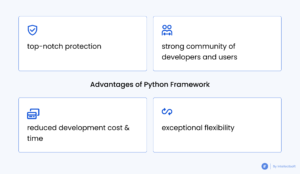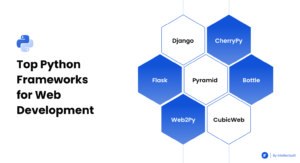Python is steadily increasing in popularity and remains the second most common language in the world, with 11.3 million software developers using it around the globe.
Aside from computer science, Python language has proven to be effective for plenty of other areas, such as statistics, data analysis, physics, economics, electronics, and even the sociology department offers an introductory programming course for the students.

Python is one of the fastest-growing and most powerful languages with easy-to-use syntax, dynamic semantics, and hundreds of robust libraries and frameworks, which is extensively used for web development as well as for big data, machine learning, and artificial intelligence.
The world's largest companies such as Amazon, Spotify, Quora, and Google are employing the Python web development framework because they always search for innovative technologies and solutions and want to develop advanced applications suiting many requirements.
According to the latest reports, about 42% of developers claimed that they are using Python as their primary language. Apparently, there are plenty of Python frameworks and features that make it stand out among other web development languages. Let’s check out the key Python frameworks for web development every software engineer should consider before developing websites.
What are Python Frameworks for Web Development?
Python is an excellent language to learn to create programs for both newcomers and experienced developers as it emphasizes code readability and features numerous frameworks that aim to cushion the whole software development project.
Python frameworks automate common application building processes and implementation with the help of the programming language.
To be more specific, Python frameworks provide the foundation to build the program on top of, which significantly contributes to the time-efficiency as engineers don't have to start developing from scratch and can focus on the application logic without handling low-level details and dealing with repetitive functions.
By the way, the difference between frameworks and libraries isn't always clear. Although both libraries and frameworks are reusable pieces of code, they are not interchangeable: while frameworks offer the architecture of the application, libraries provide the collection of packages that performs a specific set of tasks and operations.
Why are Python Frameworks Significant for Web Development?

Even though Python frameworks are not an integral part of building applications, they play a significant role as these frameworks facilitate the development by providing particular functionality and allow software engineers to re-use generic modules, and instead of executing routine processes, developers can concentrate on more specific components.
So when software engineers start building a Python-based app, they usually consider an array of Python frameworks for their project and choose the most appropriate one.
The core advantages of the Python web frameworks that demonstrate their importance for web development are:
- Top-notch protection
Built by experienced software engineers, frameworks take care of safety and, therefore, boast effective protection against a number of attacks and threats and give developers tools to avoid mistakes causing security problems.
- A strong community of developers and users
An ever-growing community of professionals, who improve the platform on an ongoing basis, can provide an immediate response to any problem that may arise. In addition, communities of users offer detailed documentation and articles to give answers to all questions.
- Reducing time and money spent on development
With frameworks, you receive the fundamental structure, which allows you to avoid reinventing the wheel, and thus you save both time and costs in creating an application and deployment, and therefore improve the overall efficiency.
- Flexibility
Due to the high flexibility, frameworks are used to develop micro functions as well as to support the front-end and back-end development for larger projects.

Types of Python Frameworks for Web Development
Typically, Python frameworks are divided into three categories, which are full-stack frameworks, micro-frameworks, and asynchronous frameworks.
Let's find out the meaning of each type:
- Full-stack framework
As the name implies, the full-stack type is a framework that provides the tech solutions for two basic parts of development: front-end (also known as the client-side) and back-end (the server-side). This category of frameworks is used for any type of application.
- Micro-framework
Unlike a full-stack framework, a micro-framework is a lightweight type that refers to a minimalistic web application, which lacks most of the functionality you might meet in a full-fledged web application framework, like authentication, authorization, and data abstraction layer.
- Asynchronous framework
The foundation for Python asynchronous frameworks is the asyncio library that is applied to create concurrent code using the async syntax.
Best Frameworks for Web Development in Python

Django
Created in 2003 and released in 2005, Django serves as a tool to develop almost any type of website offering the functionality that is ready to be imported into a project. This Python framework is the best option for building highly scalable complex web applications, enabling fast and secure development of sites.
The key benefits of using one of the best Python frameworks are:
- You can utilize it in the development of a variety of products, from CMS to social networks.
- Due to the MTV architecture, the process of transmitting over the Internet is getting much faster.
- Uses Get Method to transfer data and encrypts the essential information including the passwords with a secret key.
- Taking advantage of the Django framework allows developers to handle a huge number of new customers or users, data, transactions, and large amounts of user requests without affecting the UX.
CherryPy
The second most popular and widely beloved Python web application framework is CherryPy, an open-source and object-oriented development tool that is compatible with different operating systems aiming to make the whole application development much easier due to the simple syntax.
The pros of CherryPy in web development:
- It enables handling a great number of users without compromising on performance.
- It comes with a lot of functionality with dispatching templates, tools, and plugins needed to launch top-class apps.
- The flexible framework offers easy and seamless integration with any standard Python library.
Flask
Classified as a feature-rich microframework, Flask provides tools and technologies to create and run websites as well as web applications of different complexity whether it be a web page, blog, or commercial site.
The engineers are free to plug any extensions and add all necessary functionalities to the foundation to develop all kinds of projects. Nowadays, this development tool is considered an up-to-date and modern framework that keeps the core of the app simple and scalable.
The key highlights of the framework you should know:
- Featuring plenty of external libraries, Flask ensures prompt and effortless integration.
- This Python framework is known for fast templates, integrated support for unit testing, and WSGI that is used to communicate with the web servers.
- Flask is excellent to get the heads around as it is well-documented and simple, which leads to faster development
Pyramid
Utilized by such big companies as Yelp, Mozilla, Reddit, and NewCars.com, an open-source Pyramid framework is aimed at achieving as much as possible due to the minimalistic approach. In addition, the popular framework is known for its ability to run well with both small and large applications.
The prime characteristics of the Pyramid framework include:
- You receive an extensive set of add-ons, featuring the same quality as the Pyramid core itself, that provides additional functionality.
- It has a handful of tools, third-party plugins, and libraries including dashboards and admin panels.
- The framework tool is known for its modular architecture, testability, and flexible authentication and authorization.
Bottle
Released in 2009, Bottle is another easy-to-use and lightweight micro-framework with minimal tools, which is the perfect option for engineers who are searching for flexibility and generic functionalities to create simple websites and small-scaled web apps with the help of third-party HTTP/WSGI servers.
The main features of the framework are:
- Distributed as a single file module, the frame doesn’t have an excessive amount of various features, but it comprises the most important ones.
- If you want to focus on code readability and simplicity, then using Bottle is your best bet.
- The Bottle framework has a shallow learning curve as it requires only basic knowledge of both Python and web programming.
Web2Py
Web2Py is a full-stack framework that allows developers to use the web-based IDE for the development of fast and secure web applications. With this Python framework, engineers can perform the development, deployment, debugging, testing, and maintenance of the applications via the web interface. Also, the tool is known for including a pure Python-based template language and two markup libraries: markdown2 and markmin.
- With Web2Py, developers can create dynamic web content.
- It supports MVC Architecture, which makes the development process quicker and simplifies complexities with coding.
- The framework has a mature community of developers around the world who are always ready to provide you with the necessary information.
CubicWeb
Written in Python and licensed under the LGPL, CubicWeb is known as a free-to-use and open-source web application framework that encourages developers to create web apps reusing a wide range of cubes. Additionally, CubicWeb is a great tool to experiment with the semantic web as it boasts an extensive documentation set.
The distinguishing features of CubicWeb are:
- It contains a robust library of reusable components that provide additional functionality.
- To create web apps, developers have to follow object-oriented design principles.
- The framework enables multi-database support and simplifies data-related queries with RQL.
If you want to go beyond Python web development and learn more about other frameworks, check out this article. You will uncover the top 10 most popular tools for Android framework development, their valuable features as well as benefits they offer for an app product for Android devices.

Wrapping Up
As you can see, there is a great number of popular Python frameworks that are worth considering before you start building applications. However, finding the best Python framework for web development depends on many factors such as the type of application, time-to-market, and tech skills.
To determine whether or not the framework fits your project, you need to know the complexity of your app as large products require a full-stack framework, and the development of simple applications uses micro-frameworks.
At Intellectsoft, we have a team with a solid background that aims to help organizations develop websites and web applications. Moreover, we provide expert consulting about our software development services. So, whether your business needs an augmented staff, an innovative tech solution, or consultancy, we can help you.
Get in touch with our experts to learn more details about the features of the best Python frameworks to choose the right option that will enhance product development for your company and will help you launch the best app today!
